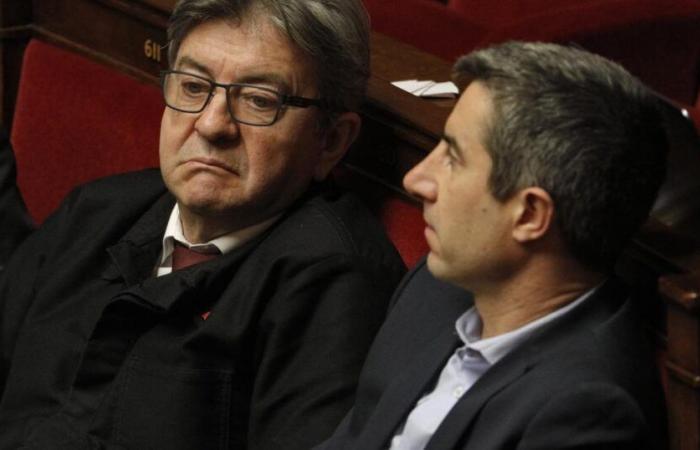
FIGAROVOX/MAINTENANCE – In his Modern portrait of the French leftwhich appears this January 24, political scientist Adrien Broche deciphers the new internal debates on the left in matters of economy, identity, secularism, from the 2010s to the present day.
Adrien Broche is a pollster, head of political studies at the Viavoice institute and expert associated with the Jean-Jaurès Foundation. He publishes Modern portrait of the French left (Éditions de l’Aube, 2025).
LE FIGARO. – Your analysis of the left extends from the 2010s to the present day. Does the Terra Nova report, a year before the 2012 presidential election, mark the left's abandonment of the social in favor of the societal? Is this observation which underlies the chronological delimitation of your reflection?
Adrien BROCHE. – Things are, in my opinion, more complex: the transition from social to societal is less a reality than a debate as such on the left. In my book, I try to reproduce the arguments of each camp as best as possible. Indisputably, the famous Terra Nova note proposed an electoral coalition made up of educated urban dwellers, young people and residents of working-class neighborhoods, quite foreign to the DNA of the socialist left. If I start my reflection from this «moment»it is because it seems to me that this note activates an intense and full-fledged discussion within the left and even among those involved in the debate of ideas in France.
In reality, the Terra Nova report owes its posterity to the many criticisms that were addressed to it. In any case, this sequence opens important debates on the relationship of the left to its electoral sociology: should it continue to address popular categories? If so, by strategic motivation or by moral motivation? In my book, I distinguish two main families of criticisms addressed to the Terra Nova proposal. The first comes from the socialist idea, proposing the reconquest of popular categories through the reinvestment of the social question, this is more or less what François Ruffin is proposing today. A second relates to the republican idea in that it proposes to emphasize the valorization, sometimes considered as abstract, of the markers of our collective republican identity.
The entire second part is devoted to the identity divisions of the left. How did the wave of attacks in 2015 constitute a turning point in identity on the left?
The 2015 moment is indeed an upheaval in that it accelerates the transformation of the so-called issues “cultural”in the broad sense, that is to say which do not fall within the socio-economic domain. THE “societal” is refocusing on identity, and the place of the identity question is growing on the right and on the left. It also takes significantly different forms depending on political traditions: on the right, the debate revolves more around the civilizational issue when, on the left, it crystallizes on the question of secularism. The major event of the 2015 attacks hits an ideological family which is partly largely imbued with what some have described as“economism”. This will also open a very lively debate on the left and beyond.
The so-called “secularist” position is today associated with the liberal left while the “flexible” position refers to the most radical fringes. This is a major reversal
Adrien Broche
Several readings will conflict. A part of the left, a minority, adheres to the reading of “lone wolf” which evacuates the collective springs that could explain the transition to violence. Another is tempted to explain jihadism by social origin when a last one, embodied by Manuel Valls, then prime minister, refuses any explanation, on the grounds that this would amount to excusing terrorists. Things get considerably worse since in reaction to a so-called reading “economist”a fraction of the left comes to consider the question of identity as having taken precedence over the social question: we should therefore concentrate our action on it. Problem: a large part of this fraction, itself convinced of the primacy of the identity question over the social question, intends at the same time to fight identitarianism… Hence the difficulty encountered by Manuel Valls, whose ambition nevertheless seemed arise from a correct intuition.
In terms of secularism, “the terms of the debate are confused” you write. For what ?
Beyond the controversies, the debate on secularism is completely revealing of the troubled waters in which certain minds on the left, and even on the right, swim. The socialist tradition, supported by the contributions of sociology, consists of undoing the myth of the sovereign subject and perfectly free in his choices that the liberal reading proposes, to go quickly. Hence the need to bring about a conception of freedom which authorizes interventions to correct these determinisms and these influences which guide and weigh on the choices of individuals.
-Problem: if this reading is followed with regard to, for example, the influence of social factors on the occurrence of riots in July 2023, or the influence of gender or class determinisms on the choices and chances of young people, this paradigm is completely ruled out when it comes to the wearing of religious symbols. Thus, women who wear the hijab or the abaya are made, by certain significant readings on the left, perfectly responsible for a choice made valid simply because it is expressed. This argument is not surprising when made from a liberal perspective. However, it seems difficult to me to encode it in a socialist tradition or in a republican tradition.
Also read
Looking towards the 2027 presidential election, François Hollande wants to regain control of the left
Hence a fundamental inconsistency which affects the entire political sphere. At the same time, therefore, an ideological family which shares a socialist affect, but also a right supposed to adhere to a liberal philosophy from which it evacuates a large part of the system to limit it to the economic field. For a long time, the radical left was deeply imbued with anticlericalism, when a more liberal left (therefore associated with the right of the left) appeared less strict on this separation of religion and politics. This pattern has been reversed: the so-called position “secularist” is today associated with the liberal left when the position “flexible” refers to the most radical fringes. This is a major reversal.
In your opinion, the conflicts in Ukraine and Gaza have reactivated an old dividing line around anti-totalitarianism. For what ?
This divide, very important in the 60s, 70s and 80s, had obviously diminished since the fall of the wall and the Soviet bloc. However, the divide opposing a left attached to the promotion of human rights to a left which sees in them, following the Marxist tradition, formal rights opposing the conquest of “real rights”has resurfaced recently. He structured the European campaign around the Ukrainian question. The Gaza issue complicates things since the attention given to it in the name of human rights by a part of the left, mainly rebellious, comes into direct contradiction with the sympathies it cultivates at the same time for Vladimir Putin or Bashar al-Assad .
I believe that the contemporary evolution of La France insoumise testifies to a penetration of reactionary affects within the radical left
Adrien Broche
You interpret LFI's positioning as a sign of a “unconscious nationalist” even reactionary. Is Jean-Luc Mélenchon the last politician, on the left, to embody a certain idea of the nation?
I'm talking about a “unconscious nationalist”not from a national unconscious. I do not believe that we can say that the left has forgotten the nation: a part, faithful to the socialist and republican tradition, on the other hand conceives it less as an identity heritage than as the necessary framework of social interconnections, by valuing more a republican grammar than a patriotic grammar. The case of Jean-Luc Mélenchon is still different for me. Its recent transformation embraces an electoral strategy of coalition of anger by exploiting reserves of votes which lie dormant in working-class neighborhoods.
Also read
“The majority of contributors are left-wing”: how Wikipedia ceased to be neutral
But, contrary to what some people criticize him for, I do not subscribe to a reading that describes him as a deconstructor of France or the promoter of unbridled progressivism. On the contrary, I believe that the contemporary evolution of La France insoumise testifies to a penetration of reactionary affects within the radical left. This is demonstrated in particular by its positions on the international scene and more recently by the distrust of any irreverence towards beliefs, and not only with regard to Islam! As proof, I take his reaction to the opening ceremony of the Olympic Games. While we often see in a part of a so-called left “reformist-republican”which Manuel Valls embodied for a good part of the past decade, a symbol of the permeability of certain progressives to reactionary ideas, I believe that the matter is not so simple.
Editions de l'Aube





